Berthold Goldschmidt Timeline
A year by year alignment of Goldschmidt's life and works
Biographical information compiled by Bernard Keeffe and David Allenby
The chronological list of works indicates the publisher of each work. For those published by Boosey & Hawkes, links are provided to useful information including scorings, durations and repertoire notes.
Born in Hamburg on 18 January to Adolf and Henny Goldschmidt, second of five children (two sisters and a brother die in infancy). His father works in family business as a merchant, importing bedroom accessories. Both parents are keen music-lovers, his mother an amateur soprano, and his father an avid concert and opera-goer who had regularly seen Mahler conduct at the Hamburg Opera in the 1890s.
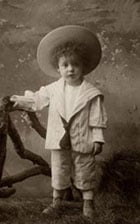
Begins piano lessons
Attends Oberrealschule St Georg, and makes rapid progress in English and French.
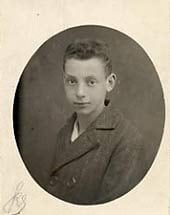
Barmitzvah on 16 January at Bornplatz Synagogue.
Studies philosophy at Hamburg University, and takes private lessons in music theory from Werner Wolff. Meets Busoni who inspires him to become a composer. Hears visiting conductors such as Artur Nikisch, Fritz Reiner and Vaclav Talich and modern repertoire including Busoni’s Doktor Faust and Schreker’s Chamber Symphony.
Enters Hochschule für Musik, Berlin, in composition class of Franz Schreker (along with Krenek, Haba, Petyrek and Horenstein) and studies conducting with Rudolf Krasselt and Julius Prüwer. Studies philosophy and history of music and art at Friedrich-Wilhelms-Universität where professors include Curt Sachs and Hugo Friedländer.
for piano (1922 rev.1958) BH
Plays in premiere of Piano Quintet (lost) at the Hochschule. Discovers short story by Stendhal, Les Cenci. Freelance keyboard work with the Berlin Philharmonic includes two of Berg’s Three Orchestral Pieces, Bartók’s Dance Suite, Webern’s Passacaglia under the composer’s direction, Mahler’s Symphony No.8, and the first Berlin performance of Schoenberg’s Gurrelieder, for which he also coaches the choir. Around this time starts close friendship with the singer Ines Loewen.
for piano (1923 rev.1957) BH
Joins staff of Friedrich-Theater, Dessau, as assistant to Franz von Hoesslin. Conducts Suite stilisierter Tänze (a precursor of the Suite op.5) and composes a Requiem for chorus and orchestra (lost). Official conducting career in Berlin launched with Staatsoper Orchestra performances of Grieg’s music to Peer Gynt at the Schiller-Theater.
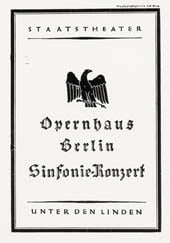
Awarded Mendelssohn State Prize for Passacaglia. Joins Berlin Staatsoper as unpaid Korrepetitor, including coaching singers in preparation of premiere of Berg’s Wozzeck and playing celesta in performances.
for orchestra BH
Erich Kleiber conducts Berlin Staatskapelle in premiere of Passacaglia. String Quartet No.1 played by Deman Quartet, winning admiration from Schoenberg. Conducts Concert Overture (lost) in Chemnitz. Signs publishing contract with Universal Edition.
(1925-26) BH
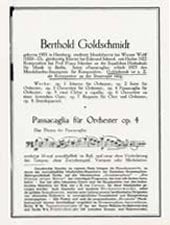
Writes incidental music to a play by Knut Hamsun and makes acquaintance of the leading actor and director, Carl Ebert. Invited to be composer, conductor and adviser to Ebert at Hessische Landestheater in Darmstadt, where he conducts works including Milhaud’s Le boeuf sur le toit and Stravinsky’s Mavra.
for orchestra BH
Conducts premiere of Partita in Schwerin. Premiere of present version of Overture ‘The Comedy of Errors’ in Oldenburg.
Overture ‘The Comedy of Errors’ for orchestra (1925/28) Sch
Conducts premiere of Vorspiel zu einem Revolutionsdrama (lost) in Frankfurt. Begins composition of Der gewaltige Hahnrei. Piano Sonata premiered by Bruno Eisner at Beethovensaal in Berlin and played by Franz Osborn at ISCM Festival in Geneva. Johannes Schüler conducts Partita in Oldenburg. Premiere of Suite op.5 in Hamburg.
A musical tragi-comedy in three acts (1929-30) BH
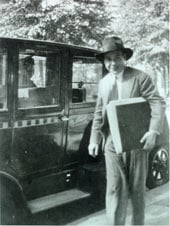
Travels to Paris to obtain belated copyright permission from Crommelynck for operatic setting of his play as Der gewaltige Hahnrei. Completes the opera and Universal Edition offers the premiere successively to Leipzig, Dresden, and Mannheim.
for speaker, chorus, percussion and piano (1930-31) BH
Moves to Berlin, working at Städtische Oper with Ebert. Appointed conductor of a radio orchestra in Berlin, for programmes of light music and opera excerpts. Conducts Dresden Philharmonic in Promenadermusik (lost) at ISCM festival in Bad Pyrmont and meets Copland and Blitzstein. Travels to Russia to conduct summer concerts with Leningrad Philharmonic and meets Shostakovich. Visits Frans Masareel in Paris and obtains from him the rights to make a dance version of Die Idee (ballet remains unrealised). About this time Ines Loewen breaks off relationship with the composer.
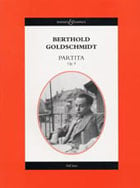
Successful premiere of Der gewaltige Hahnrei at Nationaltheater in Mannheim. The work is programmed by Ebert for the 1932/33 season at the Städtische Oper in Berlin.
for orchestra, wind band or piano (1932 arr.1938) BH
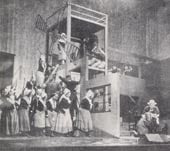
Plans an orchestral suite from Hahnrei for concert performance. When National Socialists achieve political power, Goldschmidt and Ebert are dismissed, and Berlin production of Hahnrei abandoned. His compositions continue to be performed but only in secret. Becomes conductor of orchestra of Jewish musicians intending to join the Palestine Orchestra (later the Israel Philharmonic).
for orchestra (1929/33) BH
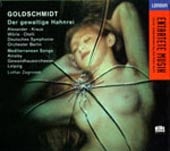
Completes Variations on a Palestine Shepherd's Song and Three Songs for coloratura soprano and piano. Meets his future wife Karen Bothe.
for piano BH
During rehearsals for Jürgen Fehling’s production of Wilhelm Meister at the Staatstheater, the identity of the composer of the incidental music is discovered to be Goldschmidt, and a number of actors stage anti-Jewish protests. Word reaches Goering who orders the music to be removed, but the intendant intercedes with Goebbels and it is performed with the composer’s name suppressed. Is Interrogated by Gestapo officer, but when it turns out they are fellow music-lovers, he advises Goldschmidt to leave Germany immediately. Gives his manuscripts to a friend for safe-keeping (but the house is bombed in the war and many scores lost).
for high voice and string orchestra BH
In October emigrates to England, chosen because of the BBC’s international reputation for supporting modern music, and rents flat in Belsize Park, London. Works unoffically as teacher and coach, including giving lessons in Lieder interpretation.
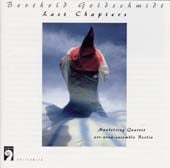
Composes String Quartet No.2 and Ciaccona Sinfonica. Karen Bothe emigrates to London and they are married.
Composes symphony and harp concerto (both destroyed). His father dies in Hamburg.
Kurt Jooss commissions for his company the ballet Chronica, as a successor to The Green Table. Karen sings with Glyndebourne chorus.
for orchestra (1938/58/86) BH
His mother emigrates to England, living in Ashtead, Surrey, during the war years.
Polish Dance Suite for orchestra (1939-40) Pet

Composes Greek Suite, commissioned by music publisher Max Hinrichsen
for orchestra (1940-41) BH
Appointed as Music Director, BBC German Service until 1947, broadcasting banned Jewish music to Germany including Mendelssohn and Mahler.
By the end of the war 22 members of his family have perished in Auschwitz and Belsen, while the survivors have emigrated as far afield as the USA and South Africa, leaving him isolated.
Completes Sinfonietta (part lost, part withdrawn)
Granted British citizenship. BBC commissions music for radio plays. Invited by Carl Ebert to be chorus master at Glyndebourne Opera. Conducts Verdi's Macbeth (replacing George Szell) at first Edinburgh Festival, and Mozart's Die Entführung at the Bath Festival. His conducting activities increasingly centre on work for BBC Third Programme, particularly with the BBC Scottish Orchestra.
transcribed for orchestra BH
Composes incidental music for radio production of Shelley’s The Cenci.
for string trio BH
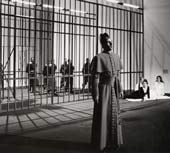
Premiere of Concertino for harp and chamber orchestra in Los Angeles (withdrawn)
Opera in three acts (1949-50) BH
Festival of Britain opera competition. One of four prizewinners with Beatrice Cenci (others are Arthur Benjamin’s A Tale of Two Cities, Alan Bush’s Wat Tyler and Karl Rankl’s Deirdre of the Sorrows), but the works remain unperformed.
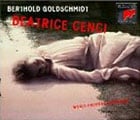
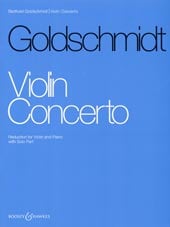
Over a two year period, composes concertos for violin, cello and clarinet, premiered in radio recordings by Erich Gruenberg, William Pleeth and Gervase de Peyer, with the BBC Scottish Orchestra conducted by the composer
for voice and piano BH
In celebration of his 50th birthday, the BBC broadcasts half hour of excerpts from Beatrice Cenci, with the composer conducting the London Philharmonic Orchestra. His mother dies in Hove, Sussex.
First performance of Sinfonietta by the Suisse Romande Orchestra under Harold Byrns
for solo violin (1954/55) BH
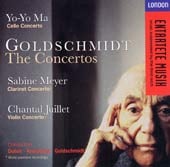
Composes Mediterranean Songs for high voice and orchestra. Turns away from composition and concentrates on conducting.
for high voice and orchestra (1957-58) BH
Begins collaboration with Deryck Cooke (and later David and Colin Matthews) on complete performing version of Mahler’s Symphony No.10
Takes over BBC studio recording of Nielsen's Saul and David at 48 hours’ notice, the opera’s first performance outside Denmark. Premiere of Mediterranean Songs in New York. Records first complete performance in UK of Mahler's Symphony No.3 with Philharmonia Orchestra, broadcast the following year to launch BBC’s Mahler centenary series.
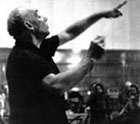
Conducts BBC Symphony Orchestra in broadcast programme featuring Deryck Cooke's reconstruction of parts of Mahler’s Symphony No.10
Conducts London Symphony Orchestra in completed Cooke version of Mahler's Symphony No.10, with further performances in Berlin, Munich and Darmstadt
His wife dies of leukemia after a long illness and constant nursing
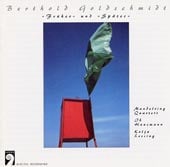
At suggestion of Gervase de Peyer, breaks 24-year silence with Clarinet Quartet. Is invited to New York and Yale University
(1982-83) BH
80th birthday celebrations include run-through of scenes from Der gewaltige Hahnrei at Trinity College of Music in London, conducted by Bernard Keeffe. Meets David Drew and begins publishing collaboration with Boosey and Hawkes
Travels to Austria for premieres of Letzte Kapitel and Marche Militaire at Mürztaler Werkstatt
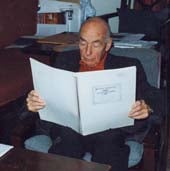
Attends chamber music concert of his music at Pasadena Conservatory, USA. Premiere of Belsatzar, commissioned for the Mürztaler Werkstatt. Completes Piano Trio.
for chorus BH
Invited to Berliner Festwochen where Simon Rattle conducts German premiere of Ciaccona Sinfonica at Philharmonie to prolonged applause. Goldschmidt introduces first German performance of String Quartet No.2 by Auryn Quartet.
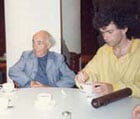
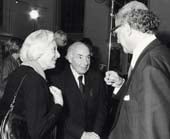
Premiere of his opera Beatrice Cenci at Queen Elizabeth Hall, London in concert conducted by Odaline de la Martinez, with Helen Lawrence in the title role, also broadcast by BBC. Attends opening of Jewish Museum in Rendsburg. BBC TV screens Goldschmidt film portrait The Lost Composer.
Attends premiere in Rendsburg by Auryn Quartet of String Quartet No.3, commissioned by Schleswig-Holstein Ministry of Culture
(1988-89) BH

Simon Rattle conducts first British public performance of Ciaccona Sinfonica in Birmingham. Release of first Goldschmidt CD on Largo
for violin and viola BH
Berthold-Goldschmidt-Archiv established at Berlin Akademie der Künste
for string trio BH
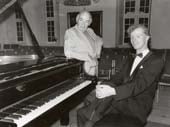
Completes Capriccio for solo violin for Kolja Lessing. Second Largo disc wins Preis der Deutschen Schallplattenkritik. Travels to Berlin for premiere of Retrospectrum. Attends Decca recording and first Berlin performance (concert) of Der gewaltige Hahnrei, conducted by Lothar Zagrosek.
for solo violin (1991-92) BH
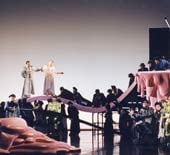
90th birthday concert in London arranged by Kerstin Linder-Dewan, featuring young performers. In Lübeck for premiere of String Quartet No.4 by Mandelring Quartet. Awarded Bundesverdienstkreuz (Order of Merit) by German Federal Government. Simon Rattle conducts Ciaccona Sinfonica at the BBC Proms.
for violin and cello BH
Travels to Montpellier for concert premiere of Violin Concerto, with Chantal Juillet conducted by Charles Dutoit. Goldschmidt is Honoured Artist at Berlin Festwochen, including German premiere (concert performance) and Sony recording of Beatrice Cenci. Der gewaltige Hahnrei staged by Harry Kupfer at the Komische Oper, a first Berlin production ‘postponed’ from 1933. Stage premiere of Beatrice Cenci at Magdeburg Opera. Rediscovery of early scores including Passacaglia, Partita and Suite in Vienna and surprise presentation to the composer in Berlin. Composes Les petits adieux. Conducts performances of Violin Concerto with Chantal Juillet in Madrid and London and records the work for Decca.
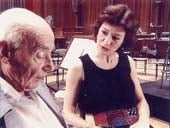
Rondeau ‘Rue du Rocher’ composed for Chantal Juillet, premiered in Saratoga, and recorded in orchestral version in Berlin with composer conducting. Makes two trips to Switzerland, for premiere of Les petits adieux at Lucerne Festival conducted by Charles Dutoit, and Der gewaltige Hahnrei at Bern Opera. Attends Gramophone Awards ceremony on behalf of Entartete Musik composers. NDR TV screens Goldschmidt documentary by Cordelia Dvorak and Ronald Zag Man muss nur überleben.('One must just survive')
or violin and orchestra or piano (1994/95) BH
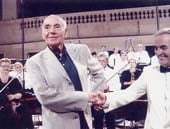
Completes his final work, Deux nocturnes. Yo-Yo Ma plays Cello Concerto with Montreal Symphony Orchestra. Composer attends BBC Proms in London for UK premiere of Passacaglia, conducted by Yakov Kreizberg. Hears new Decca CD of his orchestral works: the Goldschmidt Album. Dies peacefully on 17 October at his flat in Belsize Park.
Publishers:
BH=Boosey & Hawkes
Sch=Schott
Pet=C.F.Peters


